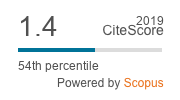Evaluation of social competencies in chemical engineering: Application and results of the pilot test (academic year 2012-2013)
Abstract
The Escola Tècnica Superior d’Enginyeria Química has a long tradition in the deployment of social competencies in engineering curricula through Integrated Projects (IP) carried out in structured teams. Social competencies are taught and practiced during the development of the IPs. We conceptually introduce a methodology for a 360o assessment of the students’ social competencies, as a tool to foster the improvement of their competency levels. In this article we analyze the results of the pilot test where the aforementioned methodology has been implemented in the Bachelor studies of Chemical Engineering. The results indicate that it is possible to objectively obtain the student’s competency level discriminating among different social competencies, as well as among different students in the same team. The application of this tool fosters the development of specific educative actions to help the students with low competency profile, to reach acceptable levels for a successful insertion in the labor market.
Keywords
Full Text:
PDFDOI: https://doi.org/10.3926/jotse.151
This work is licensed under a Creative Commons Attribution 4.0 International License
Journal of Technology and Science Education, 2011-2024
Online ISSN: 2013-6374; Print ISSN: 2014-5349; DL: B-2000-2012
Publisher: OmniaScience







